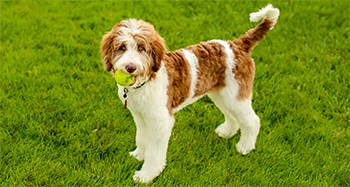A Brief History
The Aussiedoodle is a hybrid breed of dog that has been around for many years. There is not a big history behind the Aussiedoodle’s origin, but the two dogs that make up this popular breed –the Australian Shepherd and the Poodle – do have a long history.
The Australian Shepherd came to the United States from Australia and was bred for use as a herding dog. They became more well-known and popular in the 1950s when they were seen in movies and rodeos.
The Poodle is said to have gotten its origin in France, although some believe they came from Asia. They were widely used as water dogs and duck hunters in France. Both breeds have been used as guide dogs, therapy dogs, drug detection dog, and search and rescue dog.
When these two breeds were originally mixed together, dog owners called them Australian Poodles. Once they gained popularity in the United States, they were known as Aussiedoodles.
Aussiedoodles are created by mixing a purebred Australian Shepherd with a purebred Poodle. When breeding them, the Australian Shepherd is usually the female because having Poodles carry a litter of puppies from an Australian Shepherd could pose a health risk to the Poodle because of the potential size of the pups.
Despite both dogs being purebred, the litter is not registerable because the puppies are mixed breeds and not recognized by the American Kennel Club.
Temperament – Personality
The Aussiedoodle has so many positive qualities, it’s hard to know where to begin but easy to understand why they are so popular. They’re a very intelligent dog with a sweet, outgoing personality.
Their intelligence and trainability, no doubt, come from the fact that both the Australian Shepherd and the Poodle are both very intelligent breeds. In fact, the AKC consistently ranks the Poodle among the top 3 most intelligent dog breeds in America.
The Aussiedoodle’s temperament is a combination of environment and heredity. If both parents are mellow, easy-going and happy dogs, chances are excellent that the offspring will possess many of these same qualities.
This is even more so with the mother because the mother tends to have a bigger influence on the puppies at least the first couple of months of its life. However, environment and training also play a role in a dog’s temperament.
Are Aussiedoodles A Good Family Dog?
Aussiedoodles are very devoted to their family members, and this devotion makes them excellent family dogs. One quality, although it may be annoying and troublesome, definitely comes from heredity. Keep in mind that Aussiedoodles are half Australian Shepherd. Australian Shepherds were originally bred to be herding dogs, and this is still in their bloodlines.
It’s not unusual to see an Aussiedoodle attempting to “herd” its family members around the house or yard especially young children. They do this by nipping at or bumping their legs or ankles. It’s their instinct and not them being aggressive or mean.
This is why it’s important to socialize and train the Aussiedoodle starting at a young age. The Aussiedoodle is a loud dog by nature and will bark a lot and at a lot of things if allowed. It’s important to start training the dog early in life that he doesn’t need to bark at every animal or thing he encounters.
Are Aussiedoodles Good With Kids?
Other than the possible and occasional “herding”, the Aussiedoodle is very good with kids. In fact, many owners claim they are the perfect pet for their kids. They’re gentle, loving, playful and very laid back.
Their intelligence allows them to protect the child while still being an active playmate. They are particularly good with older children because older children can match the dog’s medium to high energy level.
The dog will play outdoors with kids for hours if it’s allowed. Another quality that makes Aussiedoodles good family dog and good with kids is that they are very protective of their family but are not an aggressive dog.
Physical Traits
The Aussiedoodle is a small to average size dog that can weigh anywhere from 25 to 70 pounds. The size can vary depending on what type of Poodle is used in the breeding.
The bigger range in size can come from the Australian Shepherd being mixed with a Standard Poodle, whereas mixing the shepherd with a Toy Poodle would definitely result in a smaller Aussiedoodle. Hybrid dogs like the Aussiedoodle generally have a slender, yet muscular build.
Like their size, the Aussiedoodle’s coat can be determined a lot by the Poodle side of the family. It can be a little wavy; it can be very wavy, or it can even by slightly long and curly.
However, the Aussiedoodle’s coat is generally of medium length. The colors of the coat can also vary as well. They can come in a variety of shades of gray, black or white.
Do Aussiedoodles Shed?
One would think that since Poodles are considered as hypoallergenic as dogs can get, Aussiedoodles would fall in the same category. That is not the case because Australian Shepherds have a smooth yet double coat of hair.
Despite this dual coat, the coat is very soft and typically doesn’t shed all that much. The amount of grooming they get has a lot to do with the amount the dog might shed.
The type of coat (shaggy and fluffy or short and curly) will also determine the amount of brushing the dog will require. One thing that Aussiedoodle owners really enjoy about this dog is the various types of cute haircuts available to them.
Care and Maintenance
The Aussiedoodle will require regular care and maintenance. Maintenance and good care involve not just brushing and combing the dog but also training, socializing and providing the dog with plenty of exercise and mental stimulation.
Canine Hygiene
Maintenance of the Aussiedoodle also includes trimming nails as needed and keeping the ears dry and clean. Some dogs’ ears only require occasional cleaning, and others may need them cleaned at least once a week.
Australian shepherds often develop black gunk in their ears if the ears are not cleaned regularly. Some of this is due to regular activity, and some of it can be allergy-related. If the ears are not cleaned regularly, ear infections can develop.
Aussiedoodles often enjoy being in the water, which is another trait picked up from the Poodle side. If your dog spends a lot of time swimming or even just frolicking in the water, it’s important to make sure the dog’s ears a thoroughly wiped out and dried. This can be done with a soft rag or cotton balls.
You may also want to brush the dog’s teeth regularly. This serves two purposes. It enhances good dental care and keeps the dog’s breath smelling fresh.
Socializing
Socializing is very important for your Aussiedoodle. The more the dog is socialized and trained at a young age, the more well-adjusted and easy going the dog will be as an adult dog (check out our socialization guide and checklist, here). Many dog owners underestimate the importance of socializing their dog with other dogs, other people, and new environments.
Although dogs have become a very big part of family’s today and often accompany them on trips and vacations, not everyone takes their dog with them. Many times, this is because the dog isn’t socialized well and therefore not well-mannered and well-behaved when out in public.
However, if suddenly the dog has to leave the home to go to the vet or a doggie daycare or whatever, there can be some problems if the dog hasn’t been socialized throughout its life. It’s a lot easier to handle a small puppy than it is to try to slow down a 60-pound adult dog.
Food and Nutrition
Make sure your Aussiedoodle gets a diet of high-quality dog food. Your veterinarian can recommend a good brand of dog food based on the dog’s size and age. It should also be food that has meat listed as one of the top three ingredients.
Grains are not good for dogs and can cause allergy issues for many, so avoid dog food where the first couple of ingredients are corn or wheat products. The dog should have access to fresh, clean water at all times.
Do Aussiedoodles Need To Be Groomed & Bathed?
Aussiedoodles need to be both groomed and bathed. The amount of maintenance will depend on the type of coat the dog inherits. The coat the dog inherits is usually dependent on what type of Poodle is used in the mix. If the dog has a curly coat, he’ll probably require daily brushing, whereas a wavy coat will require less frequent brushing.
The curly coat will also require clipping or trimming every two to three months. Failure to brush and/or trim regularly will result in the dog’s hair matting, which can become very problematic and unhealthy.
The better the dog is groomed and trimmed, the less the dog will shed. Aussiedoodles should also be bathed occasionally but not that often. The frequency of bathing typically coincides with the time the dog spends indoors or outdoors.
If the dog spends most of the time indoors, he should only need to be bathed every three or four months. If the dog spends a lot of time outdoors and gets pretty dirty, you may want to bath him every five or six weeks.
How Much Exercise Do Aussiedoodles Need?
Some dog breeders and trainers will tell you that exercise is almost as important to the dog as food and water. Providing your Aussiedoodle with regular exercise will not only keep him in the best possible condition but will also keep him from being bored and destructive.
Try to implement mental stimulation into the dog’s daily exercise regimen.
As important as walks are for the dog, they also need something challenging. Playing catch or hide-and-seek are good stimulators for the dog. They’ll also love interactive toys like the ones where you can store treats inside, and the dog has to figure out how to get to the treat.
Common Health Issues And Special Needs
It’s often been said that hybrid dogs are healthier than purebreds and less likely to develop breed-specific diseases. Part of this is true, and I will explain why.
Poodles, for instance, are prone to developing certain diseases or health issues. If you’re breeding one Poodle with another Poodle, the chances are much higher of the litter developing one of these health issues.
But, if you’re breeding a Poodle with an Australian Shepherd, and the Australian Shepherd is not prone to developing this disease, you’ve decreased the chance of the litter developing the disease. It often falls back to the “genetic lottery”.
The Aussiedoodle is generally a pretty healthy dog. This might come from the fact that the Australian Shepherd is one of the healthiest breeds around.
However, the Aussiedoodle is still prone to developing some health issues. Because the Aussiedoodle comes from two dog breeds, we’ll mention the health issues from each breed.
- Hip Dysplasia – This genetic disease, the result of hip sockets not forming correctly, causes the hip joint to become weak and deteriorate. Unfortunately, both Poodles and Australian Shepherds are prone to developing this disease.
- Epilepsy – This condition includes symptoms like confusion, drooling, walking in place, breathing difficulties and seizures. It’s a common health issue for Poodles but is rare in Australian Shepherds.
- Progressive Retinal Atrophy – This disease affects the retina and can lead to total blindness because it typically affects both eyes at the same time. Although this may happen to Australian Shepherds, it’s rare and is more common with Poodles.
- Addison’s Disease – Common with Poodles, this disease is caused when the dog’s adrenal glands don’t produce sufficient amounts of the hormone cortisol.
- Canine Hypothyroidism – Also common with Poodles, this health issue happens when there is an insufficient level of thyroid hormones.
- Bloat – This can happen to Standard Poodles and other large, deep-chested dogs. The stomach becomes bloated, twisted and can trap air inside the stomach.
- Hypoglycemia – This results when there is a rapid decrease in blood sugar levels. It’s very common with Poodle puppies.
- Elbow Dysplasia – This condition, which is common to Poodles and sometimes Australian Shepherds occurs when the elbow joints become dislocated and weak. The Orthopedic Foundation of America can screen dogs for both elbow and hip dysplasia.
- Eye Problems – Several eye problems can affect the Australian Shepherd. These include Collie Eye Anomaly, Colobomas and Cataracts are all common with the Australian Shepherd. Breeders should have their Australian Shepherds screened by a board-certified veterinary ophthalmologist. The results can be recorded with the Canine Eye Registration Foundation.
- Multiple Drug Sensitivity – Common with Australian Shepherds, this disease occurs when the shepherd is hypersensitive to common veterinary medications.
- Autoimmune Disease – This disease, very common with Australian Shepherds, happens when the dog’s thyroid doesn’t make the right amount of hormones, and its immune system becomes defective and damages parts of the dog’s body.
What Roles Are Aussiedoodles Best Suited For?
The Aussiedoodle’s loving nature and loyal personality tend to make it best suited for a companion or all around family dog. It loves its family, enjoys playing with children and gets along well with other animals.
They are also very active and enjoy participating in sports, making them the ideal candidate for agility, flyball, and other similar dog sports.
However, many would argue that this dog’s high intelligence is wasted as just a family pet. They make very good therapy and service animals. Working in that capacity provides them with the physical and mental stimulation they enjoy so much.
How Much Does an Aussiedoodle Cost?
The cost to become an Aussiedoodle owner can vary and depend on many things.
- Breeder’s reputation
- Breeder’s location
- The lineage of the puppy
- Supply & demand in the area
- Level of training
- Age of dog
- Breed lines
- Litter size
- Whether it’s from breeder, rescue or shelter
Despite being a hybrid or “mixed” breed dog, the Aussiedoodle can be registered through the International Designer Canine Registry. Although the average cost for an Aussiedoodle from a breeder is about $1,000, they can go anywhere from $2,000 to $10,000 if the dog comes with papers and you want show quality or breeding rights.
Dogs that are close to the higher amount will generally come from top breeding lines and have excellent pedigrees.
Finding Reputable Breeders
Finding reputable breeders can often be harder than you’d think. Just because someone advertises their adorable puppies on their Facebook page does not make them a responsible breeder.
Do some research and ask for references from any breeder you may be considering. Your local veterinarian may be able to offer information on reputable breeders. Other organizations that may be helpful include:
- International Designer Canine Registry
- American Kennel Club
- The Australian Shepherd Club of America
Keep in mind that the internet can be a valuable resource in finding reputable Aussiedoodle breeders just as long as you do your research and check any reviews on any breeder you may consider using.
Adopting An Aussiedoodle
If you’re not interested in breeding or showing your Aussiedoodle and only want this dog because you really like the breed and want one as your next pet, you may be lucky enough to find one in a shelter or local humane society.
You’ll still have to pay a fee to adopt, but the fee will be much less than through an Aussiedoodle breeder.
Adoption fees usually run anywhere from $150 to $400, and these fees cover spay/neuter fees, vaccinations, and shots. You’ll also be required to fill out an application, prove you have an adequate home for the dog and can care for the dog.
Image Credit: Cottonwood Creek Doodles





